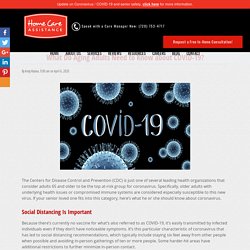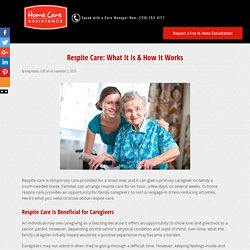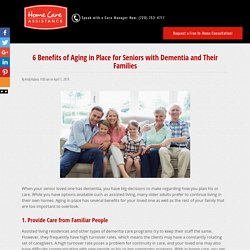

Home Care Assistance Denver
Home Care Assistance is one of the most reliable caregiver agencies offering hourly and 24-hour care services to aging adults. When it comes to professional home care, Denver caregivers who are expertly trained in at-home elderly care can provide daily assistance. Our live-in caregivers use Cognitive Therapeutic Method to enhance memory, visual-spatial perception, and also help slow cognitive decline in seniors. Denver home care professionals undergo vigorous training to learn about the innovative senior care methods. From providing stellar services to senior clients to creating effective care plans, we can offer help with everything. If you wish to schedule a consultation, call us at 720-753-4717.
How Does Aging Affect Seniors Emotionally? What Are the Emotional Effects of Aging? Those aches and pains seniors experience are often more noticeable to others, but seniors also experience emotional changes that should be considered.

The emotional effects of aging include positive and negative benefits for seniors and their families. Exploring how your elderly loved one’s emotions may change can help you understand what he or she is going through each day. Experiencing More Anxiety It would be wonderful if life slowed down after retirement, but seniors also have their sources of stress. In exchange for work stress, your loved one may worry about finances, fret over an upcoming health test, or have fears about losing someone he or she loves. A senior’s anxiety can be mitigated with the help of a professional caregiver. Facing Regrets Some seniors enter their golden years with lists of things they wish they had done differently. Feeling Depressed Depression encompasses many different emotions, but a feeling of prolonged sadness is the hallmark characteristic. What Do Aging Adults Need to Know about COVID-19? What Should At-Risk Seniors Know about Coronavirus? The Centers for Disease Control and Prevention (CDC) is just one of several leading health organizations that consider adults 65 and older to be the top at-risk group for coronavirus.

Specifically, older adults with underlying health issues or compromised immune systems are considered especially susceptible to this new virus. If your senior loved one fits into this category, here’s what he or she should know about coronavirus. Social Distancing Is Important Because there’s currently no vaccine for what’s also referred to as COVID-19, it’s easily transmitted by infected individuals even if they don’t have noticeable symptoms. It’s this particular characteristic of coronavirus that has led to social distancing recommendations, which typically include staying six feet away from other people when possible and avoiding in-person gatherings of ten or more people.
Nutritious Ways to Satisfy Your Aging Loved One's Sweet Tooth. As a caregiver, it’s important to steer your senior loved one toward nutrient-rich food choices.

But this doesn’t mean your loved one has to give up his or her penchant for some sweetness in his or her diet. In fact, seniors tend to respond better to diets that include a variety of foods. Fortunately, there are some nutritious and delicious ways to satisfy your loved one’s sweet tooth. Try Delicious, Naturally Sweetened Smoothies Smoothies can be delicious and healthy sweet treats if you include naturally sweet fruits, especially various types of berries, which are often rich in essential nutrients, including vitamins C and K, manganese, and a type of B vitamin called folate. . • Nuts, nut butters, and seeds • Bananas, which are an excellent source of potassium • Greek yogurt or milk for added protein Some seniors find it difficult to prepare nutritious meals and snacks because of health issues or mobility limitations.
Explore Your Options with Frozen Fruit Treats. 5 Tips for Helping an 80-Year-Old Recover from a Stroke. Overcoming the complications of a stroke is challenging for older adults, but it isn’t impossible.

With proper care, you can increase your aging loved one’s survival odds and help him or her retain various skills following the brain attack. Below are tips you can use to help an 80-year-old loved one recover from a stroke. 1. Promote Healthy Eating Before seniors over the age of 80 are released from the hospital after having strokes, medical providers often want to monitor their eating habits. An in-home caregiver can prepare nutritious meals for your loved one while he or she is recovering. 2. Temporary loss of language skills is common in older adults following strokes. What Is Respite Care? An Overview. Respite care is temporary care provided for a loved one, and it can give a primary caregiver or family a much-needed break.

Families can arrange respite care for an hour, a few days, or several weeks. In-home respite care provides an opportunity for family caregivers to rest or engage in stress-reducing activities. Here’s what you need to know about respite care. Respite Care Is Beneficial for Caregivers An individual may see caregiving as a blessing because it offers an opportunity to show love and give back to a senior parent. Caregivers may not admit it when they’re going through a difficult time. Family caregivers sometimes need a break from their caregiving responsibilities.
6 Reasons to Care for an Aging Parent with Dementia at Home. When your senior loved one has dementia, you have big decisions to make regarding how you plan his or care.

While you have options available such as assisted living, many older adults prefer to continue living in their own homes. Aging in place has several benefits for your loved one as well as the rest of your family that are too important to overlook. 1. Provide Care from Familiar People Assisted living residences and other types of dementia care programs try to keep their staff the same. 2. Older adults sometimes equate going to an assisted living facility with giving up their independence. The cognitive challenges that accompany dementia often leave aging adults unable to manage everyday tasks, which puts their safety and health at risk.